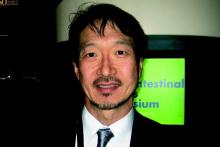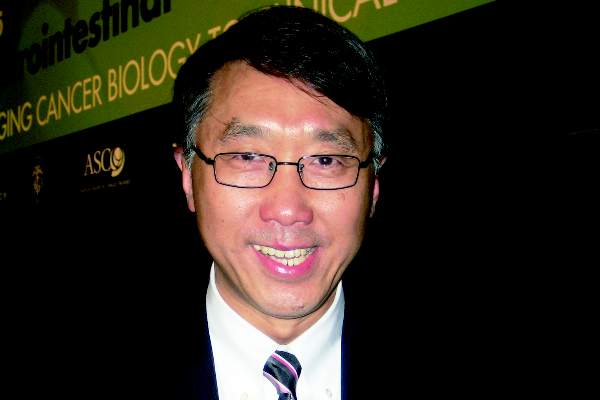User login
SAN FRANCISCO – Baseline levels of alpha-fetoprotein (AFP) may help identify patients with advanced hepatocellular carcinoma (HCC) who are most likely to benefit from treatment with the antiangiogenic agent ramucirumab, suggests a study reported at the 2015 Gastrointestinal Cancers Symposium.
Researchers led by Dr. Andrew X. Zhu of Harvard Medical School and director of Liver Cancer Research at the Massachusetts General Hospital, both in Boston, performed subgroup analyses of data from the randomized phase III REACH trial. The trial pitted ramucirumab (Cyramza) against placebo as second-line therapy in 544 patients with advanced HCC who had previously received sorafenib.
Ramucirumab is an antibody to the vascular endothelial growth factor receptor 2 (VEGFR2). It is currently approved by the U.S. Food and Drug Administration for the treatment of esophagogastric cancers and non–small cell lung cancer.
The trial, which was sponsored by Eli Lilly, failed to meet its primary endpoint of significantly improving overall survival (Ann. Oncol. 2014;25 [doi:10.1093/annonc/mdu438.16]), according to Dr. Zhu.
But the new, prespecified subgroup analyses showed that patients having a baseline AFP level of 400 ng/mL or higher – typically a poor prognostic factor – had a one-third reduction in the risk of death if given ramucirumab instead of placebo (median survival, 7.8 vs. 4.2 months; hazard ratio, 0.67; P = .0059), he reported at the meeting cosponsored by the AGA Institute, the American Society of Clinical Oncology, ASTRO, and the Society of Surgical Oncology.
The findings were similar in post hoc analyses among patients who met an alternate definition of elevated AFP level of at least 1.5 times the upper limit of normal (median survival, 8.6 vs. 5.7 months; HR, 0.75; P = .0088).
Additionally, threshold analyses indicated that absolute benefit increased with AFP level in the trial population as a whole; however, patients having levels as low as approximately 10 ng/mL still derived some benefit.
“Further analysis from the REACH study has identified AFP as a potential marker for selecting patients who may benefit from ramucirumab treatment in advanced HCC,” Dr. Zhu commented. “A robust and clinically meaningful improvement in overall survival was observed in the population with an elevated AFP level above 400 ng/mL.”
Session cochair W. Ray Kim, chief of the division of gastroenterology and hepatology, department of medicine, Stanford (Calif.) University, expressed some skepticism about the new data, however, noting the lack of ramucirumab benefit in the trial population overall but the presence of benefit down to normal AFP levels in the post hoc threshold analysis. “The two results don’t seem to be congruent with each other,” Dr. Kim commented.
Various methods can be used to model the baseline AFP threshold to predict the likely benefit, Dr. Zhu replied. “Suffice it to say that if you do different modeling, the results may be slightly different. I think that probably the 400 ng/mL still gives us the confidence as best as we could. But there is no doubt in my mind that between the upper limit of normal and 400 ng/mL, there will be patients who are also likely to benefit. And I think the cutoff for this will continue to be an issue.”
A session attendee asked, “What is the underlying biology, why [do patients with] higher AFP levels respond to antiangiogenesis treatment?”
“This is obviously a very critical question that we are actively pursuing,” Dr. Zhu replied. “We think that there may be some underlying link for those patients with high AFP with increased angiogenesis. And whether this is purely driven by VEGF or VEGFR2, I don’t think that the literature is actually very clear. There is definitely mounting evidence suggesting the high-AFP group is really a unique subgroup of patients with a unique genetic signature. But how this interlink is playing, I think at this point we don’t have the clear answer.”
Ramucirumab was similarly well tolerated in patients with AFP levels of 400 ng/mL or higher, as compared with counterparts having lower levels, reported Dr. Zhu, who disclosed that he has a consulting or advisory role with Celgene, Daiichi Sankyo, Eisai, Exelixis, and Sanofi. Notably, the rate of grade 3 or worse liver injury or failure was 22% with ramucirumab vs. 31% with placebo in the high-AFP group.
“Further investigation of the relationship between baseline AFP levels and angiogenesis inhibition is currently ongoing to better understand the mechanism of ramucirumab action in HCC,” Dr. Zhu said. “Whether there will be a posttreatment response in AFP and whether the posttreatment response will predict the outcome, we are currently analyzing that.”The researchers are additionally evaluating serum biomarkers of angiogenesis. “Unfortunately, we don’t have the archived tissue that may actually allow us to do some more detailed investigation. But I think we will present the circulating angiogenesis-related biomarkers to see whether there will be an additional biomarker that will actually segregate with the elevated AFP,” he concluded.
SAN FRANCISCO – Baseline levels of alpha-fetoprotein (AFP) may help identify patients with advanced hepatocellular carcinoma (HCC) who are most likely to benefit from treatment with the antiangiogenic agent ramucirumab, suggests a study reported at the 2015 Gastrointestinal Cancers Symposium.
Researchers led by Dr. Andrew X. Zhu of Harvard Medical School and director of Liver Cancer Research at the Massachusetts General Hospital, both in Boston, performed subgroup analyses of data from the randomized phase III REACH trial. The trial pitted ramucirumab (Cyramza) against placebo as second-line therapy in 544 patients with advanced HCC who had previously received sorafenib.
Ramucirumab is an antibody to the vascular endothelial growth factor receptor 2 (VEGFR2). It is currently approved by the U.S. Food and Drug Administration for the treatment of esophagogastric cancers and non–small cell lung cancer.
The trial, which was sponsored by Eli Lilly, failed to meet its primary endpoint of significantly improving overall survival (Ann. Oncol. 2014;25 [doi:10.1093/annonc/mdu438.16]), according to Dr. Zhu.
But the new, prespecified subgroup analyses showed that patients having a baseline AFP level of 400 ng/mL or higher – typically a poor prognostic factor – had a one-third reduction in the risk of death if given ramucirumab instead of placebo (median survival, 7.8 vs. 4.2 months; hazard ratio, 0.67; P = .0059), he reported at the meeting cosponsored by the AGA Institute, the American Society of Clinical Oncology, ASTRO, and the Society of Surgical Oncology.
The findings were similar in post hoc analyses among patients who met an alternate definition of elevated AFP level of at least 1.5 times the upper limit of normal (median survival, 8.6 vs. 5.7 months; HR, 0.75; P = .0088).
Additionally, threshold analyses indicated that absolute benefit increased with AFP level in the trial population as a whole; however, patients having levels as low as approximately 10 ng/mL still derived some benefit.
“Further analysis from the REACH study has identified AFP as a potential marker for selecting patients who may benefit from ramucirumab treatment in advanced HCC,” Dr. Zhu commented. “A robust and clinically meaningful improvement in overall survival was observed in the population with an elevated AFP level above 400 ng/mL.”
Session cochair W. Ray Kim, chief of the division of gastroenterology and hepatology, department of medicine, Stanford (Calif.) University, expressed some skepticism about the new data, however, noting the lack of ramucirumab benefit in the trial population overall but the presence of benefit down to normal AFP levels in the post hoc threshold analysis. “The two results don’t seem to be congruent with each other,” Dr. Kim commented.
Various methods can be used to model the baseline AFP threshold to predict the likely benefit, Dr. Zhu replied. “Suffice it to say that if you do different modeling, the results may be slightly different. I think that probably the 400 ng/mL still gives us the confidence as best as we could. But there is no doubt in my mind that between the upper limit of normal and 400 ng/mL, there will be patients who are also likely to benefit. And I think the cutoff for this will continue to be an issue.”
A session attendee asked, “What is the underlying biology, why [do patients with] higher AFP levels respond to antiangiogenesis treatment?”
“This is obviously a very critical question that we are actively pursuing,” Dr. Zhu replied. “We think that there may be some underlying link for those patients with high AFP with increased angiogenesis. And whether this is purely driven by VEGF or VEGFR2, I don’t think that the literature is actually very clear. There is definitely mounting evidence suggesting the high-AFP group is really a unique subgroup of patients with a unique genetic signature. But how this interlink is playing, I think at this point we don’t have the clear answer.”
Ramucirumab was similarly well tolerated in patients with AFP levels of 400 ng/mL or higher, as compared with counterparts having lower levels, reported Dr. Zhu, who disclosed that he has a consulting or advisory role with Celgene, Daiichi Sankyo, Eisai, Exelixis, and Sanofi. Notably, the rate of grade 3 or worse liver injury or failure was 22% with ramucirumab vs. 31% with placebo in the high-AFP group.
“Further investigation of the relationship between baseline AFP levels and angiogenesis inhibition is currently ongoing to better understand the mechanism of ramucirumab action in HCC,” Dr. Zhu said. “Whether there will be a posttreatment response in AFP and whether the posttreatment response will predict the outcome, we are currently analyzing that.”The researchers are additionally evaluating serum biomarkers of angiogenesis. “Unfortunately, we don’t have the archived tissue that may actually allow us to do some more detailed investigation. But I think we will present the circulating angiogenesis-related biomarkers to see whether there will be an additional biomarker that will actually segregate with the elevated AFP,” he concluded.
SAN FRANCISCO – Baseline levels of alpha-fetoprotein (AFP) may help identify patients with advanced hepatocellular carcinoma (HCC) who are most likely to benefit from treatment with the antiangiogenic agent ramucirumab, suggests a study reported at the 2015 Gastrointestinal Cancers Symposium.
Researchers led by Dr. Andrew X. Zhu of Harvard Medical School and director of Liver Cancer Research at the Massachusetts General Hospital, both in Boston, performed subgroup analyses of data from the randomized phase III REACH trial. The trial pitted ramucirumab (Cyramza) against placebo as second-line therapy in 544 patients with advanced HCC who had previously received sorafenib.
Ramucirumab is an antibody to the vascular endothelial growth factor receptor 2 (VEGFR2). It is currently approved by the U.S. Food and Drug Administration for the treatment of esophagogastric cancers and non–small cell lung cancer.
The trial, which was sponsored by Eli Lilly, failed to meet its primary endpoint of significantly improving overall survival (Ann. Oncol. 2014;25 [doi:10.1093/annonc/mdu438.16]), according to Dr. Zhu.
But the new, prespecified subgroup analyses showed that patients having a baseline AFP level of 400 ng/mL or higher – typically a poor prognostic factor – had a one-third reduction in the risk of death if given ramucirumab instead of placebo (median survival, 7.8 vs. 4.2 months; hazard ratio, 0.67; P = .0059), he reported at the meeting cosponsored by the AGA Institute, the American Society of Clinical Oncology, ASTRO, and the Society of Surgical Oncology.
The findings were similar in post hoc analyses among patients who met an alternate definition of elevated AFP level of at least 1.5 times the upper limit of normal (median survival, 8.6 vs. 5.7 months; HR, 0.75; P = .0088).
Additionally, threshold analyses indicated that absolute benefit increased with AFP level in the trial population as a whole; however, patients having levels as low as approximately 10 ng/mL still derived some benefit.
“Further analysis from the REACH study has identified AFP as a potential marker for selecting patients who may benefit from ramucirumab treatment in advanced HCC,” Dr. Zhu commented. “A robust and clinically meaningful improvement in overall survival was observed in the population with an elevated AFP level above 400 ng/mL.”
Session cochair W. Ray Kim, chief of the division of gastroenterology and hepatology, department of medicine, Stanford (Calif.) University, expressed some skepticism about the new data, however, noting the lack of ramucirumab benefit in the trial population overall but the presence of benefit down to normal AFP levels in the post hoc threshold analysis. “The two results don’t seem to be congruent with each other,” Dr. Kim commented.
Various methods can be used to model the baseline AFP threshold to predict the likely benefit, Dr. Zhu replied. “Suffice it to say that if you do different modeling, the results may be slightly different. I think that probably the 400 ng/mL still gives us the confidence as best as we could. But there is no doubt in my mind that between the upper limit of normal and 400 ng/mL, there will be patients who are also likely to benefit. And I think the cutoff for this will continue to be an issue.”
A session attendee asked, “What is the underlying biology, why [do patients with] higher AFP levels respond to antiangiogenesis treatment?”
“This is obviously a very critical question that we are actively pursuing,” Dr. Zhu replied. “We think that there may be some underlying link for those patients with high AFP with increased angiogenesis. And whether this is purely driven by VEGF or VEGFR2, I don’t think that the literature is actually very clear. There is definitely mounting evidence suggesting the high-AFP group is really a unique subgroup of patients with a unique genetic signature. But how this interlink is playing, I think at this point we don’t have the clear answer.”
Ramucirumab was similarly well tolerated in patients with AFP levels of 400 ng/mL or higher, as compared with counterparts having lower levels, reported Dr. Zhu, who disclosed that he has a consulting or advisory role with Celgene, Daiichi Sankyo, Eisai, Exelixis, and Sanofi. Notably, the rate of grade 3 or worse liver injury or failure was 22% with ramucirumab vs. 31% with placebo in the high-AFP group.
“Further investigation of the relationship between baseline AFP levels and angiogenesis inhibition is currently ongoing to better understand the mechanism of ramucirumab action in HCC,” Dr. Zhu said. “Whether there will be a posttreatment response in AFP and whether the posttreatment response will predict the outcome, we are currently analyzing that.”The researchers are additionally evaluating serum biomarkers of angiogenesis. “Unfortunately, we don’t have the archived tissue that may actually allow us to do some more detailed investigation. But I think we will present the circulating angiogenesis-related biomarkers to see whether there will be an additional biomarker that will actually segregate with the elevated AFP,” he concluded.
AT THE 2015 GASTROINTESTINAL CANCERS SYMPOSIUM
Key clinical point: Pretreatment AFP levels may be a biomarker for ramucirumab benefit.
Major finding: Patients with AFP levels of 400 ng/mL or higher were 33% less likely to die if given ramucirumab instead of placebo.
Data source: A subgroup analysis of a randomized phase III trial in 544 patients with advanced HCC.
Disclosures: Dr. Zhu disclosed that he has a consulting or advisory role with Celgene, Daiichi Sankyo, Eisai, Exelixis, and Sanofi. The trial was sponsored by Eli Lilly.


